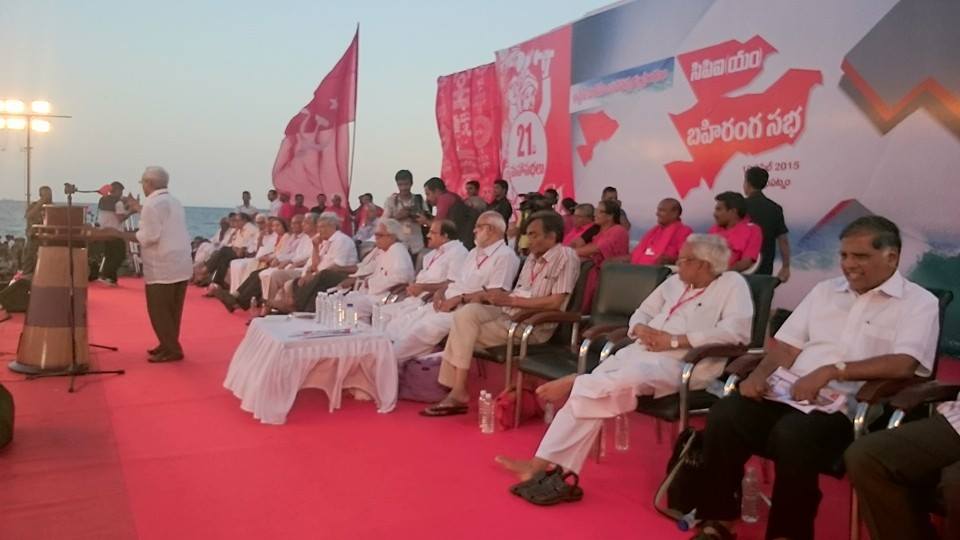The 21st All-India CPIM Party Congress, held from April 14 to 19, 2015, in Visakhapatnam, was a pivotal gathering for the Communist Party of India (Marxist) (CPIM). This Congress occurred shortly after the Bharatiya Janata Party (BJP) secured a majority in the 2014 Lok Sabha elections, marking a significant rightward shift in Indian politics. The BJP’s victory, with 282 seats and 31% of the vote share, combined neo-liberal economic policies with a Hindutva agenda, posing challenges to secularism and democracy, which the CPIM aimed to address. The preceding United Progressive Alliance (UPA) II government, led by Congress, had faced criticism for corruption, price rises, and unemployment, contributing to the political climate.
Key Discussions and Resolutions
The political resolution adopted during the Congress provided a detailed analysis of the national and international situation, outlining the party’s strategic direction. Key points included:
- National Situation: The resolution highlighted the BJP government’s aggressive neo-liberal policies, such as increased Foreign Direct Investment (FDI) in railways, defense (49% cap), insurance (49%), and real estate, alongside privatization and dilution of labor and land laws. Economic indicators showed low GDP growth below 5% in 2012-13 and 2013-14, industrial production growth at 2.5% in 2014-15, and agricultural growth at 1.1% in 2014-15, with food inflation at 8.63% despite a 55% fall in oil prices since June 2014. Unemployment rose, with youth (15-29, 330 million) unemployment at 13.3%, and agrarian distress was evident with 11,772 farmer suicides in 2013. Social inequalities were stark, with the top 1% holding 49% of wealth in 2014 (up from 36.8% in 2000), and the 100 richest billionaires’ wealth at $346 billion. The Hindutva offensive targeted minorities, with “reconversion” campaigns, church attacks, and policies like scrapping 5% Muslim reservation in Maharashtra and beef bans in Maharashtra and Haryana. Foreign policy aligned with the US, renewing the Indo-US Defence Framework for 10 years from January 2015 and proposing a quadrilateral alliance with the US, Japan, and Australia.
- International Situation: The resolution noted an uncertain recovery from the 2008 financial crisis, with the US maintaining hegemony through military interventions and dollar control, and destructive interventions in Iraq, Libya, Syria, and Afghanistan fueling Islamist extremism. Tensions with Russia over Ukraine led to sanctions and Russian bans on EU/US food imports. The US pivot to Asia to contain China strengthened ties with India and Japan, with agreements like the Trans-Pacific Partnership (TPP) and Transatlantic Trade and Investment Partnership (TTIP) covering two-thirds of the world economy. BRICS cooperation saw the establishment of the New Development Bank and Contingent Reserve Arrangement at the 6th summit in Brazil. Popular struggles against austerity in Europe included Syriza winning 149/300 seats (36% votes) in Greece in January 2015 and the emergence of Podemos in Spain. Left advances in Latin America included Venezuela facing US-backed opposition, Bolivia reducing poverty by 32.2% since 2012, and Ecuador doubling education spending to 5.2% GDP with a 40% minimum wage increase over five years.
- Party Tasks: The CPIM resolved to fight the BJP’s policies, opposing both the BJP and Congress for their neo-liberal stances, with no proposed alliances with Congress. The party aimed to develop independent strength, unite left forces (noting a 9-point charter with six parties in December 2014), and build a Left and Democratic Front. It called for mobilizing against US strategic ties, supporting anti-imperialist struggles globally, and defending minority rights, dalits, adivasis, and women, combating communalism through ideological, social, and cultural efforts. An alternative program was proposed, including 6% GDP on education, 5% on health, Rs. 15,000 minimum wage, universal Public Distribution System (PDS), land reforms, and electoral reforms like proportional representation, state funding in kind, repeal of Armed Forces (Special Powers) Act (AFSPA), Unlawful Activities (Prevention) Act (UAPA), sedition clauses, and abolition of the death penalty.
Leadership and Organizational Changes
A significant outcome was Sitaram Yechury elected as General Secretary, This leadership transition was notable, given Yechury’s prominence in party politics. The Congress also elected a new Polit Bureau, including members like Pinarayi Vijayan, Brinda Karat, and Manik Sarkar, ensuring continuity and fresh perspectives in the party’s executive body.
The 21st All-India CPIM Party Congress was a critical juncture, setting the party’s course to counter neo-liberalism and communalism, strengthen left unity, and propose an alternative vision for India. The resolutions and leadership changes reflected the party’s commitment to defending democratic and secular values amidst a challenging political landscape.The 21st All-India Party Congress of the Communist Party of India (Marxist) (CPIM), held from April 14 to 19, 2015, in Visakhapatnam, was a significant event reflecting the party’s response to the political shifts following the 2014 Lok Sabha elections. This Congress, the 21st in the party’s history since its formation in 1964, was convened amidst a backdrop of the BJP’s rise to power, marking a rightward shift in Indian politics, and the preceding UPA-II government’s challenges with corruption and economic issues.
CPIM 21st Congress Draft Review Report.
On Day 1 and Day 2 of 21st Party Congress.
